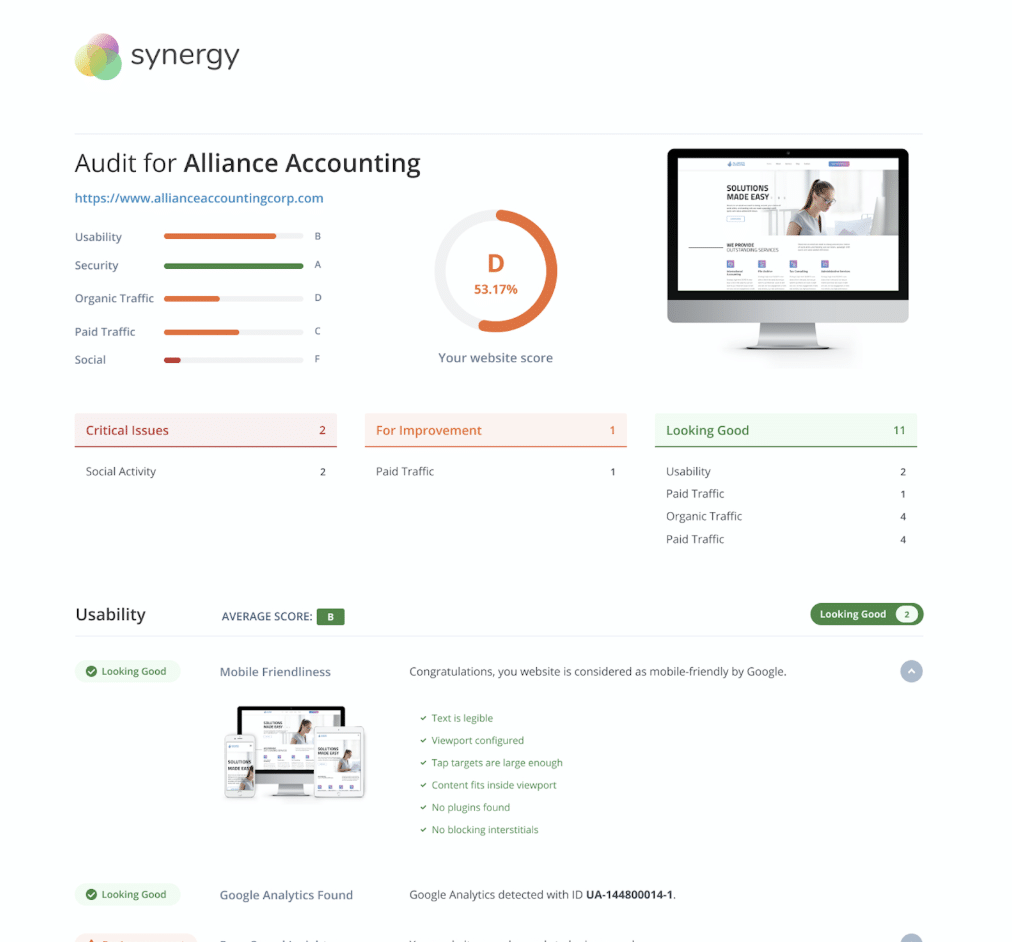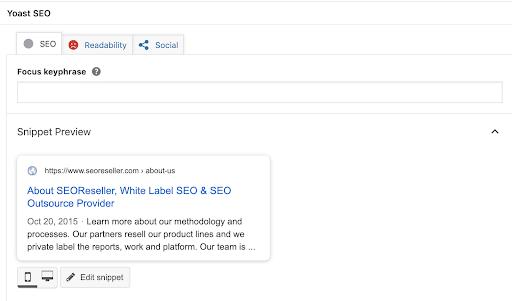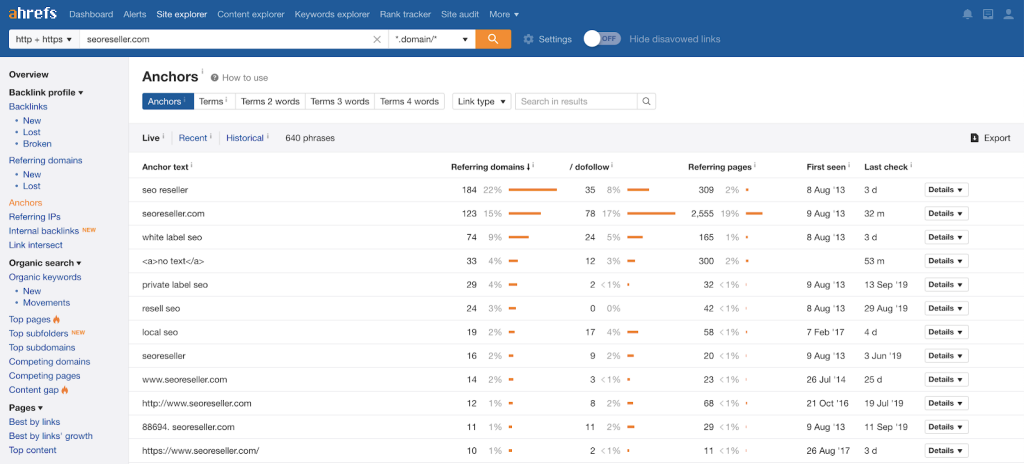Every digital marketer knows nothing is set in stone when it comes to SEO.
To continuously adapt to the needs of search users, Google updates its algorithm and focuses on value more than ever. While this implies the result from doing SEO is something you can’t control, this doesn’t mean your SEO workflow can’t be predictable.
SEO success doesn’t only come in the form of rankings. In an agency’s case, it reflects on how you can deliver value consistently as the number of clients you handle multiply. This is the purpose of having a predictable SEO workflow.
- What defines a predictable SEO workflow?
- How do you evaluate the predictability of every SEO project that comes your way?
- Most importantly, how do you implement this for both new and existing clients?
Answering these questions will help you better understand why predictability should be at the core of your SEO operations.
Why Predictability Matters for Your SEO Agency
When people speak of predictability, it’s mainly about having results from a set of processes applied consistently. However, predictability goes beyond ensuring you have the same results almost every single time you apply them.
Keeping Client Experience Uniform
Predictability allows your agency to stay on top of client expectations. This translates to maintaining a consistent experience for all clients, regardless of who in your team is handling their SEO projects. The outcome? High client satisfaction and retention.
A good example of how predictability brings about consistent client experience is McDonald’s service. Every customer expects fast, friendly service and food that tastes the same every time they order, no matter which branch they visit.
Developing a predictable SEO workflow provides your clients with the assurance that work is delivered every time they start a project with your agency. This builds trust in your agency and creates a sense of control for your clients.
Improving Work Efficiency
It took 10 people to review a proposal before it went to the prospect. Was the work carried out efficiently?
Highly unlikely.
Maintaining predictability is all about identifying how processes are done efficiently as much as knowing the results of your hard work. This means looking into how you can run your SEO agency on autopilot while providing value to clients.
Running your operations with a predictable SEO workflow allows you to measure roles and commitments against objectives. This helps you set a baseline on every task and make the necessary adjustments later on. With a predictable SEO workflow, it’s easier for your team to assign and repeat tasks at scale.
Eliminating Dependency within Your Team
While flexibility allows agencies to move as their clients demand, there needs to be accountability in delivering work. In other words, if you’re relying on a single person to do all the work and not delegating, you can expect setbacks in deliverables.
A predictable SEO workflow makes it easier to assign and repeat tasks with less dependency on talent. This provides your team with a structure to follow, so the next steps are carried out without the worry of not delivering work to clients.
Following an SEO workflow helps you identify which areas to improve among your team, so each individual will have ample training to support tasks. This provides your agency the capability to get work done without depending on a single person.
How to Make Your SEO Workflow Predictable
Each agency has its own dynamics, but the foundation that supports this dynamism is almost similar across SEO businesses. As you design your workflow, you need to identify: your team structure and responsibilities, SEO process, workload versus operational capacity, and SEO reporting.
1. Map Out Your Team’s Responsibilities
An SEO marketing process starts with knowing who will take care of what. You can’t throw keyword research to just an account manager, and you can’t expect an account manager to write the content for your client. Most of all, you can’t do everything on your own.
There should be a clear delegation of tasks among your team to make sure the one responsible for a task has the real capabilities to deliver the work needed.
At the very least, you need to fill out three key positions: account manager, SEO specialist, and creative staff.
- Account managers – They’re your front-liners. Account managers are responsible for maintaining the relationship with your clients. They provide clients with a walkthrough of your SEO process and discuss the goals and expectations for the campaigns.
- SEO specialists – They’re your subject-matter experts. Anything related to SEO – keyword research, SEO audits, on-page and off-page optimization, and technical SEO – will fall under their responsibility.
- Creative staff – They’re your writers and designers. They provide the content and design for optimizing your clients’ websites.
While each position has individual responsibilities, account managers, SEO specialists, and the creative staff collaborate with each other to perform specific tasks. The responsibilities across the team will provide you the base for developing your SEO workflow.
2. Developing Your Workflow
The key to a predictable SEO workflow is having a standardized process. While making a straightforward, clear process may require a bit of upfront work, this will help your people know exactly what they need to do should a new client comes in.
Your SEO workflow should include these major steps:
Onboarding

The goal of onboarding is to set expectations between your agency and your client. This allows your clients to have a better understanding of the value of your SEO service, the timeline for the entire SEO campaign, and the deliverables.
A well-thought-of client onboarding eliminates confusion and sets the tone for the entirety of your relationship. Account managers are mostly responsible for the onboarding process, as they use this to dig deeper into what the clients need and what their goals are.
Website Audit

This sets the direction for your SEO strategy. By conducting an SEO website audit, you can identify which issues have the biggest impact on your client’s website. In turn, this allows you to propose a roadmap or make the necessary adjustments to an existing SEO strategy. Your SEO specialist conducts the website audit, which the account manager will send to the client.
Keyword Research

Taken from ahrefs.com
Keyword research and analysis serve as the blueprint for your optimization efforts. This drives every action and decision you make—at the end of the day, your goal is to make your clients’ website rank with the right keywords.
Doing keyword research is not as complicated as what others make it seem. In fact, you can do it in five minutes (or even less). The key here is making the right analysis and providing recommendations that enable your clients’ SEO campaigns to move forward.
On-page Optimization

All the issues found in the audit and the target keywords specified will be implemented in the on-page optimization process. This includes technical optimization and maintenance tasks, such as auditing 301 redirects, updating schema mark-ups, and fixing 404 errors.
Optimizing landing pages and creating content that match keywords and user intent are also part of the on-page implementation process. In a nutshell, everything that has to do with your client’s website will fall under on-page optimization.
Off-page Optimization

This involves outreach and link building efforts. While it’s part of the website optimization, most SEO specialists use a separate process and sheet for off-page activities. Oftentimes, link building efforts require additional research for the prospect website, outreach email sent, follow-ups, and links acquired.
Off-page optimization goes beyond link building, though. This may include citation building, local directory listings, and content partnerships. These activities help in driving organic and referral traffic to your clients’ websites.
Reports
Most SEO agencies provide their clients with monthly reporting to inform them about the progress of their campaigns. A common misconception about SEO work is that everything ends with a report—what some fail to realize is how this communicates continuity for their SEO efforts.
Monthly reporting allows clients to see the value of your SEO service to their business. This also helps in managing their expectations for the coming months.
Calibration and Monthly SEO Hygiene
This is the part where you make adjustments to your SEO strategy. As SEO requires on-going efforts to show results, your workflow should include calibration and hygiene to boost ranking opportunities for your client’s website.
Calibration and monthly SEO hygiene may include additional target keywords, landing page optimization, and content creation. Some SEO specialists use this to recommend fixes for other technical issues on the website.
3. Handling Deliverables
There’s only so much a full-time SEO agency can do within a nine-to-five shift, which means not everything on an SEO task list can be done. This brings us to the next point – how do you balance deliverables for your clients?
Part of developing a predictable SEO workflow is having the knowledge of how much work you can deliver and aligning this with your operational capacity.
Forecasting deliverables starts with the revenue target of your agency. Your goal is to ensure you have enough resources to deliver the projects for your clients.
You’ll need to look at the following elements:
- Full-time employee (FTE): Allocate the number of hours a full-time staff should have every month.
- Shrinkage: Determine how much production time is lost to unavoidable circumstances, such as staff breaks, holidays, time spent on training, and sick days.
- Production day: Specify how many days in a month you will operate.
- Employee tenure and productivity: Tenure and productivity are directly related. If a new talent comes in, expect that their productivity is 50% less than the output of a tenured writer.
- Attrition rate: This is the rate at which members of your team leave the company over a given period. This is crucial in forecasting operational capacity because employee attrition can disrupt the overall output of your agency.
By monitoring these elements, you can set operational threshold for handling deliverables.
Set Milestones
It’s important to have milestones in place when starting an SEO project. This allows you to clearly define your SEO plan of action and processes that affect the deliverability of the entire project. These milestones should include the person/people responsible for specific tasks and the expected date for delivery.
Monitor the Time It Takes to Complete a Task
This helps you manage your team’s time more effectively and scale production. For instance, it takes four hours to write a 500-word content. Knowing this can help you calculate the schedule for content delivery for an SEO project.
Benchmark Work Against Resources (People)
One of the things that cause agencies to lose clients is underestimating the effort involved. This involves overpromising on delivery without considering available resources. It’s important to set a benchmark on how much work your current headcount can take for the month.
Your SEO agency doesn’t have to do everything yourself. Consider outsourcing SEO if your current numbers can’t accommodate the workload.
4. Reporting Progress
The goal of a predictable SEO workflow goes beyond getting things done efficiently—it’s also about making sure your SEO efforts are providing an impact on your client’s business.
This is where reporting comes in.
However, it’s not as simple as pulling data from Google Search Console and presenting charts and diagrams to clients who may not be as SEO-savvy as you are. Reporting progress involves showing metrics for success and providing clients with a deeper understanding of your SEO strategies.
Focus on the impact on their business
What are you trying to achieve and how does this align with your clients’ objectives? When you’re talking to a decision-maker of an enterprise, you need to provide clarity of how the data adds value to their business.
A few examples of success metrics you should be reporting are:
- Projected sales value from organic traffic
- Conversion rate from organic traffic
- Customer acquisition cost
- Customer lifetime value
- Return on marketing investment
Always frame your SEO metrics around the objectives of your clients. Show them that your SEO efforts do more than rank their business on search results.
Create a Template for Your SEO Report and Automate
Here’s a question – do you create your SEO reports from scratch for every client?
If you answered yes, it’s time to rid yourself of that practice.
A predictable SEO workflow is all about using your time wisely—and this includes preparing your SEO reports. The more time you waste building these reports, the less time you’ll have for serving your clients and focusing on the more impactful aspects of your SEO business.
There are two ways you can make this easier and scalable for your agency: create a template and automate.
You only need to include the basic details for your SEO report template:
- Summary of Key Data
- SEO Recommendations and Actionable Insights
- Results
You don’t need pointless data that clients won’t understand. Be as straightforward as you can with your reports.
Once you’ve created a template, your next step is to automate the delivery of these reports. Schedule when to send your SEO reports and set notifications for both your team and your clients.
Your Turn – Train and Discipline
It’s time to switch gears.
Integrating a predictable SEO workflow – and sticking to your prescribed process – requires more than willpower. You need discipline and training to produce high-level work consistently. Each member of your team should have the accountability to follow the workflow, but also the skillset and tools to support implementation.
As you start transitioning into a more predictable way of doing things, you’ll find it easier to maintain client relationships, scope projects, and produce results that matter to your SEO agency.